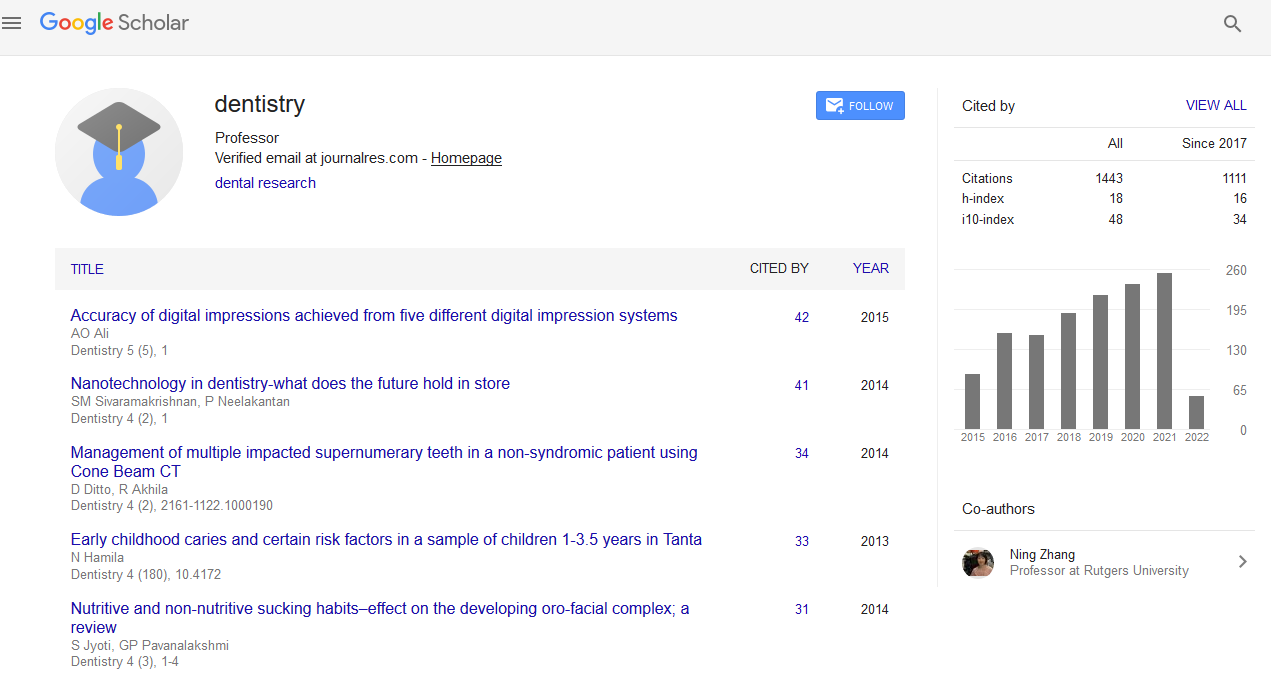Citations : 1817
Dentistry received 1817 citations as per Google Scholar report
Indexed In
- Genamics JournalSeek
- JournalTOCs
- CiteFactor
- Ulrich's Periodicals Directory
- RefSeek
- Hamdard University
- EBSCO A-Z
- Directory of Abstract Indexing for Journals
- OCLC- WorldCat
- Publons
- Geneva Foundation for Medical Education and Research
- Euro Pub
- Google Scholar
Useful Links
Share This Page
Journal Flyer

Open Access Journals
- Agri and Aquaculture
- Biochemistry
- Bioinformatics & Systems Biology
- Business & Management
- Chemistry
- Clinical Sciences
- Engineering
- Food & Nutrition
- General Science
- Genetics & Molecular Biology
- Immunology & Microbiology
- Medical Sciences
- Neuroscience & Psychology
- Nursing & Health Care
- Pharmaceutical Sciences
Performance of an oral rinse point-of-care assay to aid in the diagnosis of head and neck squamous cell carcinoma in a high risk Danish ear-nose throat clinic
24th Global Dentists and Pediatric Dentistry Annual Meeting
June 11-12, 2018 | London, UK
Michael J Donovan, David Hebbelstrup, Elizabeth Franzmann and Mads Klokker
Icahn School of Medicine at Mount Sinai, USA
University of Copenhagen, Denmark
University of Miami, USA
Posters & Accepted Abstracts: Dentistry
Abstract:
Background: Head and neck squamous cell carcinoma (HNSCC) is the 6th most common cause of cancer mortality. The ability to detect HNSCC an earlier stage could have significant impact on overall outcome. Previous studies demonstrated that a point-of-care (POC) lateral flow assay and an ELISA LAB test measuring CD44 and total protein (TP) aid in the diagnostic process for HNSCC. We sought to better understand the prospective performance of the POC assay in a hospital-based high risk oral clinic in Denmark. Methods: Oral rinses were obtained from 150 consecutive patients presenting for physical exam and biopsy in a high risk earnose throat (ENT) clinic (Rigshospitalet, Copenhagen, Denmark). Operators were provided POC visual tools to record assay results. A positive POC test is a visible CD44 band or level of TP (i.e. color-graded scale from 0-5, recommended cut-off >/=2 or adjusted >/=3), with sensitivity (Se), specificity (Sp), NPV to evaluate correlation with biopsy. Results: 131 biopsy evaluable patients, 30% with HNSCC. Average age: 57 years, 43% male, 100% white and 59% smokers. Using POC levels of CD44 or a TP cut-off of three, the assay achieved a Se of 73%, and Sp 50%. Applying a TP of two for nonsmokers and four for smokers further improved assay performance: Se 80% and Sp 43%. Normal non-smoking, female controls (n=18) had a Sp 78%. With a prevalence of 9.27%, the NPV was >90%. Conclusions: POC assay performed well for discriminating HNSCC. Additional studies are underway to further confirm these results and compare with the LAB test. michael.donovan@mssm.edu


